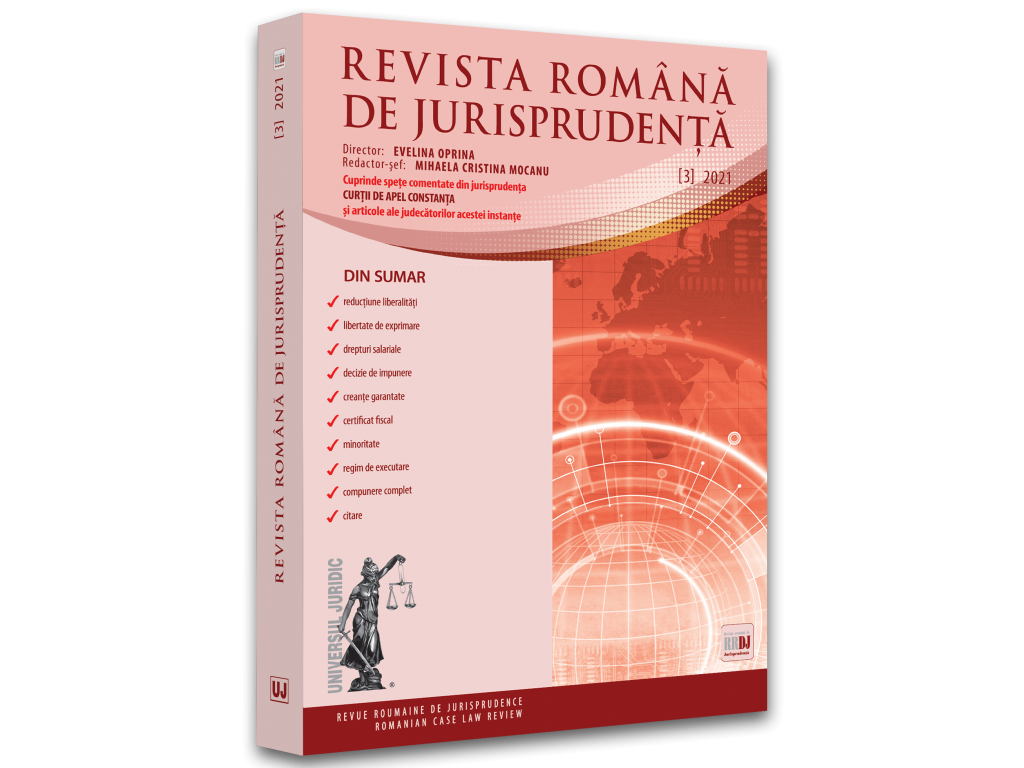Grounds for second appeal relied on omisso medio concerning the active role of the court
DREPT CIVIL ŞI DREPT PROCESUAL CIVIL
Abstract
The role of the judge in civil proceedings is determined by the following duties: throughout the proceedings, he shall recommend to the parties an amicable settlement of the dispute through mediation and shall attempt to reconcile the parties, giving them the necessary guidance; he shall give the correct qualification of the claim and of the acts and facts in dispute in relation to their content and not according to the name given by the party; he shall conduct the proceedings and may take any legal measure for the proper conduct of the proceedings; may put to the parties any question of fact or of law, even if it has not been mentioned in the application or in the statement of defence, if it may lead to the resolution of the case; may plead of his own motion infringement of public policy; may take legal evidence of his own motion, even without the parties' consent, but shall put it to the parties in cross-examination; shall give guidance to the parties for the purpose of protecting their rights and interests.
However, these powers are limited by the principle of availability, as the party may dispose of the subject-matter of the proceedings and the procedural means granted by law.
What the appellant is claiming in this case is not the correct classification of the application in relation to its content and not its misnomer, but rather the possibility for the court to choose for the claimant the appropriate legal basis for the admission of the application, thereby substituting itself for the role of its defender.
In that context, the criticism made is manifestly unfounded, since otherwise the abovementioned provisions have been infringed, which cannot be permitted. The judge cannot upset the procedural balance by acting as the plaintiff's advocate, since the opposing party also has the right to a fair trial before an impartial court.
The fact that the court held that the claim could be based on another legal institution (usucaptio), while finding that the claim was unfounded in relation to the remedy chosen by the claimant (accession), does not confer on the claimant either the right or the obligation to change the case before the court, especially not at the appeal stage. It is thus held that it is not the name given by the party to the application that is wrong, but the way chosen by the claimant does not entitle him to enforce the right claimed.
On the other hand, as regards the criticism levelled at the judgment of the first instance in relation to the application of the provisions of Article 22, it is held that in the appeal the claimant did not allege any infringement of those provisions concerning the exercise of the judge's active role, but only criticisms on the merits of the case. In this regard, the Court considers that this criticism of the judgment of first instance cannot be accepted in the light of the provisions of Article 488(2) of the Civil Procedure Code, according to which the grounds for cassation may not be accepted unless they could not be raised on appeal. By enshrining the rule that omisso medio criticisms are inadmissible, the lawmaker intended to provide additional safeguards for the extraordinary nature of the appeal, seen exclusively as a review of the legality of the judgment handed down on appeal. This is also one of the applications of the principle of the legality of appeals and is explained by the fact that, since the devolutive effect of the appeal is limited to what has been appealed against, only criticisms that were also raised on appeal can be raised on appeal. This is the only way to comply with the principle of double jurisdiction, because otherwise it would lead to the situation that certain defences, arguments of the parties would be examined for the first time by the court referred with the extraordinary appeal.








